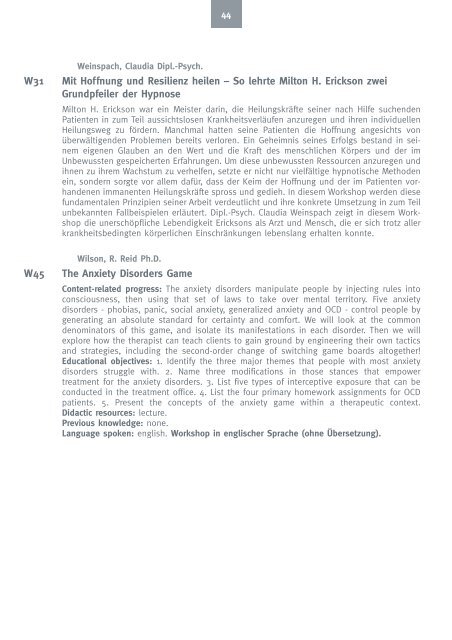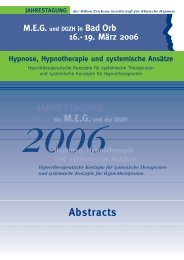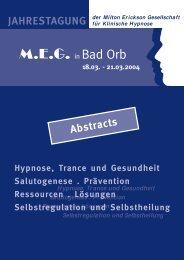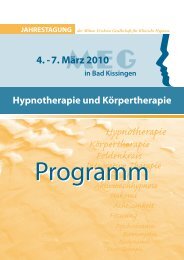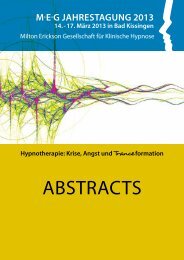Abstracts 2006 05 (Page 1) - MEG Jahrestagung 2014
Abstracts 2006 05 (Page 1) - MEG Jahrestagung 2014
Abstracts 2006 05 (Page 1) - MEG Jahrestagung 2014
Erfolgreiche ePaper selbst erstellen
Machen Sie aus Ihren PDF Publikationen ein blätterbares Flipbook mit unserer einzigartigen Google optimierten e-Paper Software.
44 45<br />
Weinspach, Claudia Dipl.-Psych.<br />
Wilson, R. Reid Ph.D.<br />
W31<br />
W45<br />
Mit Hoffnung und Resilienz heilen – So lehrte Milton H. Erickson zwei<br />
Grundpfeiler der Hypnose<br />
Milton H. Erickson war ein Meister darin, die Heilungskräfte seiner nach Hilfe suchenden<br />
Patienten in zum Teil aussichtslosen Krankheitsverläufen anzuregen und ihren individuellen<br />
Heilungsweg zu fördern. Manchmal hatten seine Patienten die Hoffnung angesichts von<br />
überwältigenden Problemen bereits verloren. Ein Geheimnis seines Erfolgs bestand in seinem<br />
eigenen Glauben an den Wert und die Kraft des menschlichen Körpers und der im<br />
Unbewussten gespeicherten Erfahrungen. Um diese unbewussten Ressourcen anzuregen und<br />
ihnen zu ihrem Wachstum zu verhelfen, setzte er nicht nur vielfältige hypnotische Methoden<br />
ein, sondern sorgte vor allem dafür, dass der Keim der Hoffnung und der im Patienten vorhandenen<br />
immanenten Heilungskräfte spross und gedieh. In diesem Workshop werden diese<br />
fundamentalen Prinzipien seiner Arbeit verdeutlicht und ihre konkrete Umsetzung in zum Teil<br />
unbekannten Fallbeispielen erläutert. Dipl.-Psych. Claudia Weinspach zeigt in diesem Workshop<br />
die unerschöpfliche Lebendigkeit Ericksons als Arzt und Mensch, die er sich trotz aller<br />
krankheitsbedingten körperlichen Einschränkungen lebenslang erhalten konnte.<br />
Wilson, R. Reid Ph.D.<br />
The Anxiety Disorders Game<br />
Content-related progress: The anxiety disorders manipulate people by injecting rules into<br />
consciousness, then using that set of laws to take over mental territory. Five anxiety<br />
disorders - phobias, panic, social anxiety, generalized anxiety and OCD - control people by<br />
generating an absolute standard for certainty and comfort. We will look at the common<br />
denominators of this game, and isolate its manifestations in each disorder. Then we will<br />
explore how the therapist can teach clients to gain ground by engineering their own tactics<br />
and strategies, including the second-order change of switching game boards altogether!<br />
Educational objectives: 1. Identify the three major themes that people with most anxiety<br />
disorders struggle with. 2. Name three modifications in those stances that empower<br />
treatment for the anxiety disorders. 3. List five types of interceptive exposure that can be<br />
conducted in the treatment office. 4. List the four primary homework assignments for OCD<br />
patients. 5. Present the concepts of the anxiety game within a therapeutic context.<br />
Didactic resources: lecture.<br />
Previous knowledge: none.<br />
Language spoken: english. Workshop in englischer Sprache (ohne Übersetzung).<br />
W14<br />
Treating OCD: The Four Homework Assignments<br />
Theoretical background: Those suffering from obsessive-compulsive disorder are convinced<br />
that great harm will come if they do not comply with rigidly set rules of safety. Their<br />
obsessions persist despite the application of logic or reason, and their compulsions are so<br />
successful at briefly relieving anxiety that they take on a life of their own. Exposure and<br />
ritual prevention is the gold standard treatment of OCD. However, the threat of maintaining<br />
attention on the feared obsessions while avoiding compulsions can be so daunting a task<br />
that patients refuse homework assignments and eventually drop out of treatment. In a<br />
strategic treatment of obsessive-compulsive disorder, the entire therapeutic paradigm is set<br />
down within the first few sessions. The therapist reframes the nature of the problem and<br />
incorporates all interventions within four simple but provocative guidelines that challenge<br />
the dysfunctional beliefs of the client. All further sessions are refinements of technique and<br />
continued expansion into the territory once controlled by the disorder.<br />
Content-related progress: Those suffering from obsessive-compulsive disorder are convinced<br />
that great harm will come if they do not comply with rigidly set rules of safety. Their<br />
obsessions persist despite the application of logic or reason, and their compulsions are so<br />
successful at briefly relieving anxiety that they take on a life of their own. The therapist can<br />
reframe the nature of the problem and incorporate all interventions within four simple but<br />
provocative guidelines that challenge the dysfunctional beliefs of the client. Participants will<br />
learn specific strategies that bring these rules to life and break these repetitious,<br />
unproductive patterns in obsessive-compulsive disorder. These skills can be applied to the<br />
treatment of washers and cleaners, checkers, repeaters, hoarders, orderers, cognitive-ritualizers<br />
and pure obsessionals.<br />
Educational objectives: 1) List the four primary homework assignments for OCD, 2) Describe<br />
ten interventions for obsessions and compulsions.<br />
Didactic resources: lecture.<br />
Previous knowledge: none.<br />
Participants will learn specific strategies that bring these rules to life and break the repetitious,<br />
unproductive patterns in obsessive-compulsive disorder. The presenter will demonstrate<br />
how the strategic therapist confronts erroneous beliefs and how he/she develops, assigns<br />
and follows up on homework. This homework will include several pattern-interruption<br />
techniques that enable clients to engage in modified versions of their obsessions and rituals<br />
that, paradoxically, aim at helping them to let go of their symptoms for good. These<br />
skills can be applied to the treatment of washers and cleaners, checkers, repeaters, hoarders,<br />
orderers, cognitive-ritualizers and pure obsessionals.<br />
Language spoken: english. Workshop in englischer Sprache (ohne Übersetzung).


